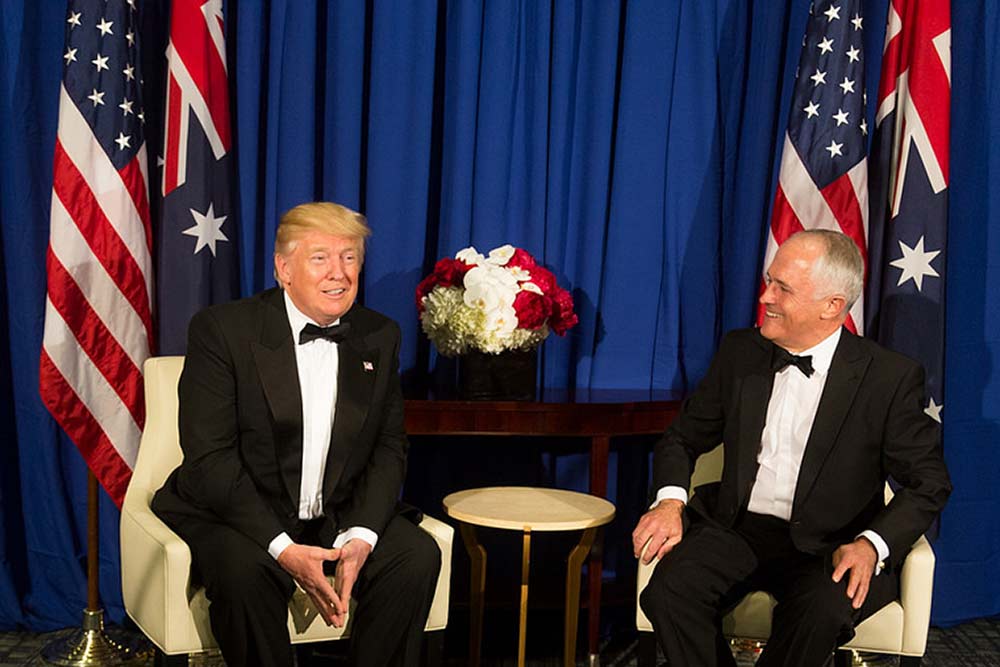
They seem to be truly representative of their nationstates, Trump the American extrovert, and Turnbull the reserved statesman. But how much deeper does their representation go? Image: The White House/flickr
If you’ve wandered near a tele or perused the general news outlets over the past week, you’ve probably caught yourself rolling your eyes at the mind-numbingly infuriating coverage of the big sandpaper-on-a-ball scandal that’s rocked the Australian Cricket Team.
The coverage of this so-called scandal by the media has been relentless, resurrecting Australia’s rigid, finger-wagging culture hellbent on shaming high profile types and kicking them while they’re down.
Why we persist at this, I have no idea. But I suspect it’s an artefact of our repressed caveman desire to revel in bloodshed and Roman gladiatorial spectatorism. In modern times, it’s subsequently evolved into a new form that disguises itself with the façade of virtue signalling.
None of this can be seen more plainly than the polarised reactions from people on social media, especially when mainstream outlets were each publishing what seemed to be about a dozen stories a day about the cricket cheating scandal.
The extreme responses were venomous. People were calling for the cricket players’ blood and making outrageous claims that because they cheated, they somehow deserved the disproportionately aggressive media response. They even claimed that the players weren’t punished enough. Angry mobs tend to excel at dehumanising their prey.
The online discussions basically degenerated into a fight between two sides. Those who thought the team members should be reprimanded but given moral support, while the other side wanted the cat-o’-nine-tails sharpened for the occasion.
Oddly, it’s stories like this that reveal something rather insidious that festers within the soul of modern Western discourse. A cruelty that hasn’t been let out to play for a long time, mainly due to the restrictive rule of political correctness that’s imposed collective politeness by force. When that happens, you don’t really quite know if people are polite because they’re genuinely nice people, or whether they simply fear the consequences of being impolite. When the rules change, members of the latter group tend to show their true colours.
With that in mind, Australians tend react to news items with intense levels of passion, but not when it comes to important matters like Robodebt, underfunding of our health and educational institutions, draconian security legislation, or human rights abuses.
Of course not, that’s often too difficult to mull over. Instead, Australians choose to voice their outrage at sport. Quite fitting for our national identity as a “laid back” lot.
However, it’s hard to pass judgement towards a people as a whole. One can only blame the media for beating a dead horse, and an unsupportive Prime Minister claiming that the team’s act of cheating “beggars belief”. Political satirists would never have dreamt of a dog’s breakfast of this calibre.
This brings me to my point of polarisation in modern discussion. And that’s the point right there – there is no discussion anymore. What we’ve been witnessing in the United States over the last decade is the decline of reason and conversation.
Whether you know someone over there that supports Donald Trump, or someone who supports any opposing Democrat, you’ve probably found rather quickly that they or others you’ve encountered on social media are a stubborn lot who refuse to acknowledge any merit from their political opposition.
The culture war in the United States has mounted its current battlefield on the internet, taking the form of what they glibly call the “meme wars”, which seek to dehumanise the opposition and simplify serious arguments into jokes and giggles.
In this ongoing political feud, a line has been drawn in the sand and you’re expected to be on one side or the other. There’s no middle ground or reason anymore.
On the other hand, let’s find a silver lining. You have to admire Americans’ passion for serious issues, whether it’s Constitutional rights, foreign policy, health care, taxation, government spending, etc. This is more than I can say for Australia’s more internalised hissy fits at relatively frivolous sport-related matters. However, to our credit, Australians aren’t anywhere near as territorial regarding political party affiliation. We’re not quite as judgey when it comes to voting Liberal or Labor.
Generally, Australians tend to shy away from matters of importance, leaving the intellectual elites and influencers in the media, the political and financial classes to deal with issues that may affect them, but are too difficult and are out of range for the regular man or woman to feel they have the authority to act. Their conventional wisdom says ‘we elect people in Canberra every three years to do it all for us’.
Will we change? Will we become a people that aren’t so apathetic? That’s not likely in the foreseeable future. Our historical origins are fundamentally different to the United States, as we never fought a war to gain independence. This continues to have a significant influence on how Australians conduct and view themselves today.
Australians certainly are capable of being as polarised as our American cousins, but we tend to choose our battles differently, for better or for worse.





